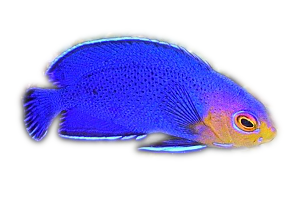
By Bob Goemans

Likely Reef Tank Suitable
Likely Fish-Only Tank Suitable
Range: Western Pacific Ocean: Indo-Malayan Archipelago, mainly the Sulawesi and Molucca Islands.
Size: 5 inches (12 cm)
Natural Environment: Inhabits areas of rich coral growths on inshore reefs at depths between 3 to about 15 feet (1 – 5 m) and mainly feeds on algae and benthic invertebrates.
General Husbandry: Occasionally seen the trade, with the juvenile quite attractive having a reddish orange body, with the pelvic and anal fins the same color. There’s also a blue horizontal line from above the eye to the caudal fin. As it grows into adulthood, it loses its bright colors and overall, becomes dark brown.
Juvenile can be quite feisty, but as it grows into adulthood, they become extremely aggressive and must be housed with very aggressive tankmates, e.g., dottybacks, large angelfishes and surgeonfishes, and triggerfishes.
As to diet, a meaty diet, e.g., live fortified brine shrimp and/or finely chopped various frozen or fresh meaty foods such as mysis, squid, fish flesh, shrimp, clam and plant material, e.g., flake foods, especially those containing Spirulina should be offered several times daily.
Taxonomy:
Order: Perciformes
Suborder: Labroidei
Family: Pomacentridae
Subfamily: Pomacentrinae
Genus: Neoglyphidodon
FYI: Cute when small, but think twice before putting this species in your aquarium!
Easy to keep well fed, yet problematic as to tankmates!
Experience Level: Intermediate
Temperament: Feisty/belligerent
Diet: Omnivore
Coral Safe: Yes
Invertebrate Safe: With caution
Acclimation Time: 30 minutes+
Aquarium Environment: Reef or fish-only aquarium
Tankmates: Aggressive
Minimum Tank Size: 55 gallons
Temperature Range: 74 - 28°F (23 – 28°C)
Specific Gravity: 1.020 - 1.026
pH: 8.0 - 8.5
